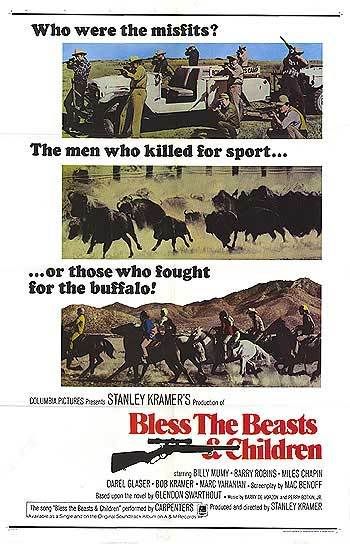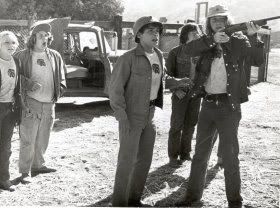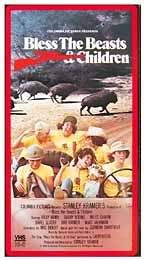
Directed by Stanley Kramer
Based on Glendon Swarthout's novel of the same name, Stanley Kramer's 1971 production of Bless the Beasts & Children remains one of my favorite films from that decade, despite the fact that it has been much maligned by critics and virtually ignored by audiences. It had a huge - almost profound - effect on me when I first saw it on late night television as a teenager, and my appreciation for the film (and book) has only increased over the ensuing years.
Swarthout's novel, published in 1970, concerns a group of teenaged boys who are spending their summer at the Box Canyon Boys Camp in Arizona. When the no-good-at-anything 'Bedwetters' (as the camp director dubs the cabin with the least sporting and competitive abilities) decide to prove their true worth by breaking out of camp one night and setting off on a dangerous trek to set free a herd of buffalo that are scheduled to culled by hunters for sport. In their ensuing journey to the killing fields, the six boys learn more about life and friendship than any parent or camp counselor could ever hope to teach. Unfortunately, at the story's tragic conclusion, they are also forced to learn about death and loss, and facing responsibility for their actions.
Kramer's adaptation of Bless the Beasts & Children sticks pretty close to its source, not surprising since the novel is written in a very visual and free-flowing style. The film starts with the six boys embarking on their mission in the dead of night, then utilizes flashbacks to illustrate their previous days at the camp, as well as select moments from their home lives. These flashback sequences, filmed in a clever and at times surrealistic style, reveal how it is the home situation which has fostered the boys' feelings on insecurity and inadequacy.
Cotton (Barry Robbins) has a military father and lives with his divorced mother, a forty-something social animal who is terrified of aging. In many ways, she resents her son because he represents a symbol of her advancing age. As Swarthout writes in his novel: 'To remain a girl, she had to keep her son a boy.'
Teft (Bill Mumy) is the tallest and most cunning and street smart of the group. Since his father is too busy playing the stock market to spend time with his son, Teft has taken to hot-wiring cars in order to gain attention.
Schecker (Miles Chapin) is the overweight son of a famous Jewish comedian, who finds it tough dealing with the pressure of having to live up to his father's success. At fourteen, Goodenow (Darel Glaser) still wets the bed and longs for the company of his real father (who in the book is deceased, although the film makes no mention of this). The Lally brothers (Bob Kramer and Marc Vahanian) are bickering siblings, the older Lally extremely spiteful of the attention which his younger brother receives.
Visually, Kramer's film is quite striking. Michael Hugo's cinematography makes great use of the beautiful Arizona landscapes (which appear often ethereal and other-worldly). The many flashback sequences are edited into the film a way that doesn't distract from the narrative or slow down its pace. The only negative aspect of the film's visual style is the use of excessive zooms and pull-backs (one of Kramer's greatest weaknesses).
Barry Devorzon's score sounds somewhat dated when listening to it on its own (it was released on vinyl on the A&M label but has never appeared on compact disc to my knowledge), but works perfectly within the context of the film. Cotton's Dream is a memorable piece of music, and was later used as the recognizable opening theme to the daytime soapie The Young and the Restless. The title song, sung by the Carpenters, was a minor hit single in 1971 for the vocal duo, and was nominated for an Academy Award.

There are a number of memorable scenes in Bless the Beasts & Children: Cotton talking Goodenow out of drowning himself in the lake after being thrown out of his cabin, the Bedwetters smoking grass for the first time. Teft standing up to their oafish cabin counselor Wheaties, and the boys making a mess of their late-night raid on a rival cabin (the rival group all urinate into a large chamber pot and douse the Bedwetters with it).
Perhaps the most powerful moment in the film is a flashback sequence which shows the Bedwetters making a day trip to the buffalo grounds, assuming they are going to see the native American animal in its natural habitat, then being exposed to the sight of the helpless beasts being methodically slaughtered. It is this sickening scene that inspires Cotton and his motley crew of misfits to take off on their midnight mission to save the remainder of the buffalo.
All of the young actors in Bless the Beasts & Children are competent in their roles, and receive equal doses of attention from Kramer. They are appealing and genuine, without being cocky or aggravating. Bill Mumy, best known at the time for his role as Will Robinson on Lost in Space, was perhaps the most experienced of the young cast members, and co-wrote It's a Beautiful Day, one of the songs heard in the film. Bill at the time was fronting his own country group, Redwood (who in 2005 issued a retrospective CD of their music).
Barry Robbins is also a standout as Cotton, the troubled but determined teen who whips the Bedwetters into shape and leads them on their mission. Robbins seemed to posses the talent to be a real star when this film was released, but simply vanished from sight (he did pop up in an episode of Columbo and in the 1978 TV movie Actor). A 1972 issue of the teen magazine 16 reported that Robbins had inherited millions from a rich aunt, so maybe he just decided to retire and enjoy the good life. He unfortunately died in 1986 at the age of just 41.
Of the adult performers, the late Jesse White is perfectly cast as Sid Shecker, the obnoxious comedian. He's the type of low-rent Vegas lounge act that you loathe on television, yet laugh and applaud wildly when you see him in person simply because he is famous. As Cotton's mother, Elaine Devry is effective in her one brief scene, and Bruce Glover (Crispin's father, who also played the homosexual hitman in the 007 film Diamonds Are Forever) is as oddball as ever as a hick pool hustler who torments the boys at a grimy diner.
As both a film and novel, Bless the Beasts & Children is at its essence both a coming-of-age story and a road movie with a difference, and has the undefinable 'weird' quality that also permeated the original Lord of the Flies. In many ways, it can be viewed as a time capsule of the period in which it was born out of, the early-1970s. With the aid of its visuals, the film in particular succeeds in capturing the social atmosphere and attitudes of this much-maligned period of modern American history, while the themes that lay at its core remain just a relevant today - if not more so - than they did thirty years ago.

Unfortunately, Bless the Beasts & Children has not yet made a legitimate appearance on DVD, while it's only video release was in the early-1980s, making it a somewhat scarce film to track down. One can only hope that a future DVD release will increase the film's appreciation. A truncated 15 minute version of the film, titled Love to Kill, was shown in American high schools in the early 1970s. Shocking Videos sell both versions of the film on one cassette or DVD-R, available from their website at:
http://www.revengeismydestiny.com/NewArrivals.html
Bill Mummy's website is at www.billmumy.com, and Mark Vahanian (who played Lally II) is now one of Hollywood's top personal trainers whose website is at www.bodycoach.com
Based on Glendon Swarthout's novel of the same name, Stanley Kramer's 1971 production of Bless the Beasts & Children remains one of my favorite films from that decade, despite the fact that it has been much maligned by critics and virtually ignored by audiences. It had a huge - almost profound - effect on me when I first saw it on late night television as a teenager, and my appreciation for the film (and book) has only increased over the ensuing years.
Swarthout's novel, published in 1970, concerns a group of teenaged boys who are spending their summer at the Box Canyon Boys Camp in Arizona. When the no-good-at-anything 'Bedwetters' (as the camp director dubs the cabin with the least sporting and competitive abilities) decide to prove their true worth by breaking out of camp one night and setting off on a dangerous trek to set free a herd of buffalo that are scheduled to culled by hunters for sport. In their ensuing journey to the killing fields, the six boys learn more about life and friendship than any parent or camp counselor could ever hope to teach. Unfortunately, at the story's tragic conclusion, they are also forced to learn about death and loss, and facing responsibility for their actions.
Kramer's adaptation of Bless the Beasts & Children sticks pretty close to its source, not surprising since the novel is written in a very visual and free-flowing style. The film starts with the six boys embarking on their mission in the dead of night, then utilizes flashbacks to illustrate their previous days at the camp, as well as select moments from their home lives. These flashback sequences, filmed in a clever and at times surrealistic style, reveal how it is the home situation which has fostered the boys' feelings on insecurity and inadequacy.
Cotton (Barry Robbins) has a military father and lives with his divorced mother, a forty-something social animal who is terrified of aging. In many ways, she resents her son because he represents a symbol of her advancing age. As Swarthout writes in his novel: 'To remain a girl, she had to keep her son a boy.'
Teft (Bill Mumy) is the tallest and most cunning and street smart of the group. Since his father is too busy playing the stock market to spend time with his son, Teft has taken to hot-wiring cars in order to gain attention.
Schecker (Miles Chapin) is the overweight son of a famous Jewish comedian, who finds it tough dealing with the pressure of having to live up to his father's success. At fourteen, Goodenow (Darel Glaser) still wets the bed and longs for the company of his real father (who in the book is deceased, although the film makes no mention of this). The Lally brothers (Bob Kramer and Marc Vahanian) are bickering siblings, the older Lally extremely spiteful of the attention which his younger brother receives.
Visually, Kramer's film is quite striking. Michael Hugo's cinematography makes great use of the beautiful Arizona landscapes (which appear often ethereal and other-worldly). The many flashback sequences are edited into the film a way that doesn't distract from the narrative or slow down its pace. The only negative aspect of the film's visual style is the use of excessive zooms and pull-backs (one of Kramer's greatest weaknesses).
Barry Devorzon's score sounds somewhat dated when listening to it on its own (it was released on vinyl on the A&M label but has never appeared on compact disc to my knowledge), but works perfectly within the context of the film. Cotton's Dream is a memorable piece of music, and was later used as the recognizable opening theme to the daytime soapie The Young and the Restless. The title song, sung by the Carpenters, was a minor hit single in 1971 for the vocal duo, and was nominated for an Academy Award.

There are a number of memorable scenes in Bless the Beasts & Children: Cotton talking Goodenow out of drowning himself in the lake after being thrown out of his cabin, the Bedwetters smoking grass for the first time. Teft standing up to their oafish cabin counselor Wheaties, and the boys making a mess of their late-night raid on a rival cabin (the rival group all urinate into a large chamber pot and douse the Bedwetters with it).
Perhaps the most powerful moment in the film is a flashback sequence which shows the Bedwetters making a day trip to the buffalo grounds, assuming they are going to see the native American animal in its natural habitat, then being exposed to the sight of the helpless beasts being methodically slaughtered. It is this sickening scene that inspires Cotton and his motley crew of misfits to take off on their midnight mission to save the remainder of the buffalo.
All of the young actors in Bless the Beasts & Children are competent in their roles, and receive equal doses of attention from Kramer. They are appealing and genuine, without being cocky or aggravating. Bill Mumy, best known at the time for his role as Will Robinson on Lost in Space, was perhaps the most experienced of the young cast members, and co-wrote It's a Beautiful Day, one of the songs heard in the film. Bill at the time was fronting his own country group, Redwood (who in 2005 issued a retrospective CD of their music).
Barry Robbins is also a standout as Cotton, the troubled but determined teen who whips the Bedwetters into shape and leads them on their mission. Robbins seemed to posses the talent to be a real star when this film was released, but simply vanished from sight (he did pop up in an episode of Columbo and in the 1978 TV movie Actor). A 1972 issue of the teen magazine 16 reported that Robbins had inherited millions from a rich aunt, so maybe he just decided to retire and enjoy the good life. He unfortunately died in 1986 at the age of just 41.
Of the adult performers, the late Jesse White is perfectly cast as Sid Shecker, the obnoxious comedian. He's the type of low-rent Vegas lounge act that you loathe on television, yet laugh and applaud wildly when you see him in person simply because he is famous. As Cotton's mother, Elaine Devry is effective in her one brief scene, and Bruce Glover (Crispin's father, who also played the homosexual hitman in the 007 film Diamonds Are Forever) is as oddball as ever as a hick pool hustler who torments the boys at a grimy diner.
As both a film and novel, Bless the Beasts & Children is at its essence both a coming-of-age story and a road movie with a difference, and has the undefinable 'weird' quality that also permeated the original Lord of the Flies. In many ways, it can be viewed as a time capsule of the period in which it was born out of, the early-1970s. With the aid of its visuals, the film in particular succeeds in capturing the social atmosphere and attitudes of this much-maligned period of modern American history, while the themes that lay at its core remain just a relevant today - if not more so - than they did thirty years ago.

Unfortunately, Bless the Beasts & Children has not yet made a legitimate appearance on DVD, while it's only video release was in the early-1980s, making it a somewhat scarce film to track down. One can only hope that a future DVD release will increase the film's appreciation. A truncated 15 minute version of the film, titled Love to Kill, was shown in American high schools in the early 1970s. Shocking Videos sell both versions of the film on one cassette or DVD-R, available from their website at:
http://www.revengeismydestiny.com/NewArrivals.html
Bill Mummy's website is at www.billmumy.com, and Mark Vahanian (who played Lally II) is now one of Hollywood's top personal trainers whose website is at www.bodycoach.com
Copyright John Harrison 2007
